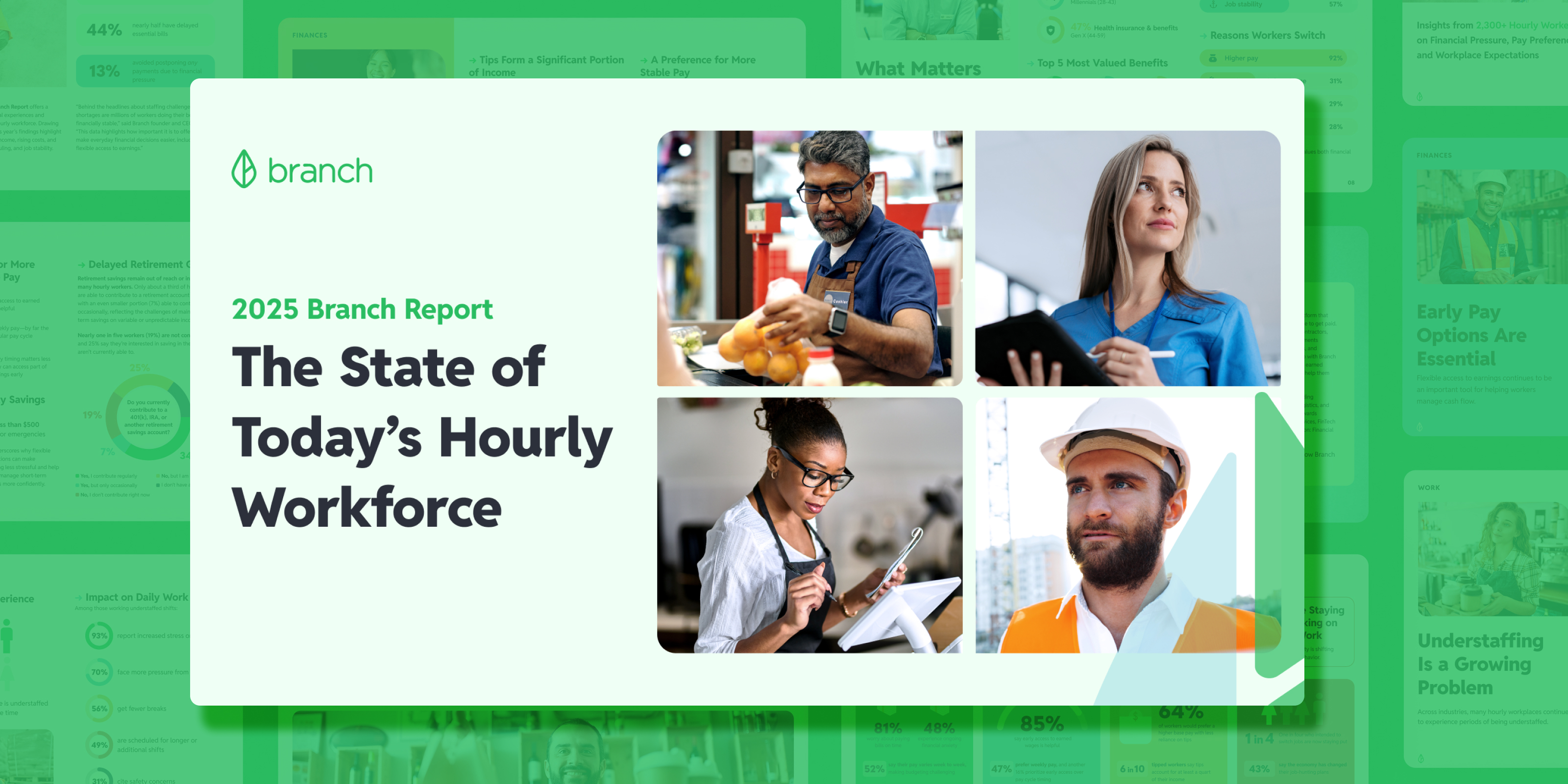
Industry Experts on the Future of Gig Work: What Businesses Need to Know
The gig economy has emerged as a powerful force, reshaping the way Americans engage with employment. In our 2023 Gig Payments Report, 61% of workers surveyed said that they complete gig work as their primary income; nearly a three times increase from two years ago when 21% of respondents said the same thing.
With this rapid growth comes a pressing need for companies to understand and address the evolving preferences of tomorrow’s talent. In a recent webinar, industry experts Kate Cardone, Head of Growth at Marqeta, and Ahmed Siddiqui, Chief Payments Officer at Branch, delved into some of the key intricacies surrounding gig work and explored strategies to better serve the needs of gig workers everywhere.
We’ve grabbed key Q&A insights from the conversation and summarized them to help you easily understand the various nuances of flexible work.
Q: How do you define gig work and gig workers?
Kate: We're defining gig workers as independent contractors, freelancers, or small business owners working under a 1099 tax status. They engage in flexible jobs or gigs, as opposed to being W-2 employees. While common roles like drivers and couriers are often associated with gig work, [the gig economy] now also encompasses various knowledge-based professions such as writers, designers, and even nurses.
Q: What has driven the shift from gig work being a side hustle to becoming a primary source of income for so many people?
Kate: Independent contractors or 1099 contractors are expected to grow to more than 50 percent of the U. S. labor force by 2050—it’s clear the gig economy is here to stay, people are gravitating towards a more flexible way to work, and businesses are adjusting their labor demands accordingly. Factors like economic instability, inflation, and adoption of new technologies have all contributed to its popularity. Meanwhile apps have made it incredibly easy for gig workers to connect with clients and pick up different shifts.
And of course when the pandemic hit, that’s when the gig economy really exploded; people sought out ways to bring in a secondary income. In our 2023 Gig Payments Report we asked gig workers their primary reasons for staying with a gig platform and they cited three main reasons:
- Flexibility of hours
- Higher earning potential
- Faster payments
Another noteworthy point was that Gen Z workers selected faster payments as their top reason to stay in the gig economy. So we're seeing flexibility and empowerment as a really big driver for gig work.
Q: What are you seeing as the biggest challenge that gig platforms are facing right now?
Ahmed: The biggest challenge is the abundance of choices available to gig workers. The most obvious example is Uber and Lyft; any Uber driver could also drive for Lyft. It's now the question of how does that person choose one over the other?
If you're a freelance writer, you've got multiple options to find freelance writing gigs. It's not like I'm a freelance writer, but then I also drive, you know? So I think that's really the major challenge here is how do you make it such that your platform stands out from similar platforms?
With low barriers to entry, workers have multiple options within a given vertical. The challenge for platforms is to become the preferred choice by providing the best work, highest pay, and fastest payment, thereby fostering worker loyalty. - Ahmed Siddiqui, Head of Payments, Branch
Q: What does gig worker loyalty mean to you? How do you define that? And how does that differ from when we look at retention, say for traditional W-2 workers?
Kate: Gig worker loyalty is the level of commitment and engagement from a gig worker to one specific gig platform. How often is a gig worker choosing your platform over others? Unlike W-2 employees who may be contractually obligated to one job, gig workers have the flexibility to move around. To succeed, gig platforms need a steady stream of workers that are committed to quality of service and their platform. The reality is that loyal workers are likely to perform better, receive good reviews, and enhance platform stability.
So how do you create loyalty? We already know there are certain things that gig workers are expecting from companies like gig availability, transparency, and a positive earnings experience. It's also crucial to ensure workers have a really good experience when interacting with your platform; you can do that by investing in technology to make sure your user experience is seamless and streamlined. Learning and skill development fosters a sense of loyalty as well, as it makes people feel like their company is investing in their abilities.
And the last thing I'll say—I think this is what Ahmed and I are probably most excited about—is the fact that we've seen 79% of gig workers are incentivized by being paid faster after a job. And 80% say that they would choose one gig platform over another, if it could pay instantly & without fees.
Q: How can companies be sure that they're standing out from the crowd?
Ahmed: Ensuring stability is crucial, whether you're a W-2 worker or a gig worker. For gig workers, platforms that are able to offer consistent work are able to enable stability. Whereas if you're a W-2 worker, it doesn’t matter, because you know that you're going to get paid at the end of the day regardless. With gig work, it could be you're getting a lot of work on a given day, but then nothing the next day.
In addition to work availability, fast access to earnings is also very important to stability. It allows gig workers to to smooth out their cash flow, handle expenses promptly, and avoid reliance on credit cards.
It's important to recognize that all these individuals working on gig platforms are essentially small business owners. Quick access to cash is a significant factor for any small business. - Ahmed Siddiqui, Head of Payments, Branch
Q: What types of those financial services are you seeing become more relevant, more popular in this space?
Ahmed: From our surveys, 83% of workers have cited that they'd be interested in financial services with the gig platform that they work with. What's really exciting about this is the idea of creating a direct connection between your source of earnings, and where you park your earnings.
What bank can actually pay you instantly after every delivery or after every ride? No bank does that. But if you're offering a bank-like service through your gig platform, you can enable things like that.

And if you know the source of an individual's income, you could provide other financial services that maybe they wouldn’t otherwise have access to. For example, if somebody has bad credit, you could potentially underwrite them for a much lower cost loan.
I think there's a lot of power in that. And I think there's a lot of opportunity that we haven't even fully explored. But it's all enabled by offering a native financial service.
Kate: Just to add, at Marqeta, we're seeing a huge boom in the demand for secured credit products, especially in the gig economy where traditional methods of lending like mortgages and credit cards are more difficult to access for an independent worker.
I think the credit builder tool will really help expand access to credit for this population, but also teach them about financial literacy and smart borrowing. It’s a very natural next step coming from the gig platforms, especially considering the 83% stat Ahmed mentioned.
Q: What creative ways have you seen companies address the needs of gig workers?
Kate: There's a lot of exciting ways to support and reward gig workers. Platforms are customizing rewards programs to cater to their specific user base. This can include tailored perks like gas rewards for drivers, similar to what Branch & Marqeta have done with the Uber Pro card.
Some platforms are gamifying the experience. What Lyft is doing is really interesting, where they're offering challenges, bonus zones, and ride streaks to make work fun. And then of course, we've talked about this, but offering instant access to wages is now table stakes.
Additionally, offering preferred access and flexible scheduling for your more loyal workers is gaining traction. And partnerships are also being formed to offer exclusive perks and benefits, such as discounts on services and affordable healthcare plans.
Q: What is one thing that you hope the audience will take away from our conversation here today?
Kate: Gig work is here to stay. Because of that, I'd like to see us understand gig workers better than ever before. Let's figure out what really drives them, and what they're seeking from work.
We also have a responsibility to increase financial security and stability in their lives. We're hearing that as one of the biggest anxieties as it relates to this type of work. How do we alleviate that? How do we teach them more about what may be unknown?
As the demand for gig work continues to grow, gig platforms will need to get bigger and better about loyalty and retention. Let's just keep asking questions and learning. What is it that we should deliver to these gig workers to keep them loyal and keep them happy? - Kate Cardone, Head of Growth, Marqeta
Ahmed: I would like to emphasize that the gig worker is a small business owner. And again, I think everybody has a goal, you know, maybe they're doing this as a single owner operator right now, but at some point, they're going to want to potentially grow their business, right?
What are some of the things that we can do to help them achieve that? It’s the ultimate American dream to have your own business. And I think these gig platforms have an opportunity to really push that agenda and help out. There are some really cool and creative financial things that we can do to help enable that.
Powering the gig payments revolution
Faster payments are paramount to unlocking gig worker loyalty and retention. Check out the 2023 Gig Payments Report or learn more about how Branch is powering faster pay for gig workers.
Continue reading
Unlock a Happier, More Productive Workforce







